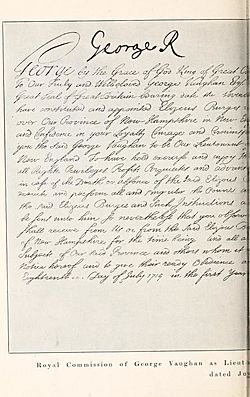George Vaughan (New Hampshire official) facts for kids
Quick facts for kids
George Vaughan
|
|
|---|---|

Royal Commission of George Vaughan
|
|
| Lieutenant Governor of the Province of New Hampshire | |
| In office 18 July 1715 – 30 September 1717 |
|
| Preceded by | John Usher |
| Succeeded by | John Wentworth |
| Personal details | |
| Born | 13 April 1676 Portsmouth, New Hampshire |
| Died | 20 November 1725 |
| Spouses | Mary Belcher, Elizabeth Eliott |
| Children | Sarah, William Vaughan, Margaret, Elizabeth, Abigail, Eliot, Mary, Jane, George |
| Parents | William Vaughan and Margaret Cutt |
| Occupation | councilor, merchant, Colonel of the New Hampshire militia |
George Vaughan (April 13, 1676 – November 20, 1725) was an important person in the early history of New Hampshire. He is best known for serving as the Lieutenant Governor of the Province of New Hampshire. This was a colony in North America that later became the state of New Hampshire. He held this important job for only about two years.
Vaughan was also a smart student. He graduated from Harvard College in 1696. Throughout his life, he worked in different roles. He was a successful merchant, a high-ranking officer (a colonel) in the local army (called the militia), and a special representative (an agent) for New Hampshire in England. He also served as a trusted advisor (a counsellor) to the government.
Contents
Early Life and Family
George Vaughan was born in 1676. His parents were William Vaughan (military officer) and Margaret Cutt Vaughan. His father, William, was a businessman from England. He moved to the Province of New Hampshire and became very rich.
George's mother, Margaret, also came from a family of merchants. Her uncle, John Cutt, was the very first governor of the province appointed by the King of England. George followed in his family's footsteps. After graduating from Harvard College in 1696, he joined the family business in Portsmouth.
In 1697, George Vaughan married Mary Belcher. She was the daughter of Andrew Belcher, a merchant from Massachusetts. Mary passed away in 1699, shortly after giving birth to a daughter who also did not survive. In January 1700, George married his second wife, Mary Elliot.
Public Service and Career
George Vaughan played a big part in the public life of New Hampshire.
Joining the Militia
When a major war called Queen Anne's War started in 1702, Vaughan joined the local army, known as the provincial militia. He quickly rose through the ranks and became a colonel. This showed his leadership skills.
Agent to England
In 1707, the local government (the provincial assembly) chose Vaughan for a very important job. He became the "colonial agent" and traveled all the way to London, England. His job was to represent New Hampshire's interests to the English government.
Becoming Lieutenant Governor
While in London, Vaughan used his connections to get an even bigger job. In 1715, he was appointed as the Lieutenant Governor of New Hampshire. He officially started this role in October 1715.
At this time, Joseph Dudley was the governor. Dudley was also the governor of the nearby Massachusetts colony. Because of this, Governor Dudley often stayed in Massachusetts and did not visit New Hampshire much. This meant that George Vaughan acted as the main leader of New Hampshire during this period.
Disagreements and Removal
In October 1716, a new governor, Colonel Samuel Shute, took over. Shute was also made governor of both New Hampshire and Massachusetts. This led to some problems between Vaughan and Shute.
Vaughan believed that when Governor Shute was not physically in New Hampshire, he (Vaughan) should have all the powers of the governor. However, Governor Shute thought Vaughan's powers should be limited when he was away. This disagreement caused a lot of conflict.
This conflict eventually led to George Vaughan being removed from his position. On September 30, 1717, he was no longer the Lieutenant Governor. Some historical records suggest he resigned due to disagreements with the local assembly about tax laws. Other records clearly state he was removed from office because of his dispute with Governor Shute.
 | Sharif Bey |
 | Hale Woodruff |
 | Richmond Barthé |
 | Purvis Young |

